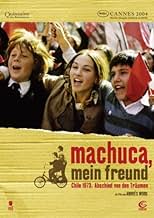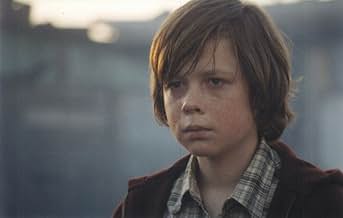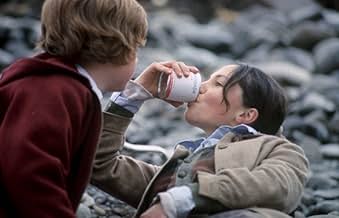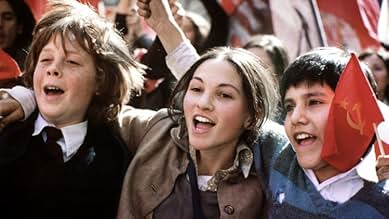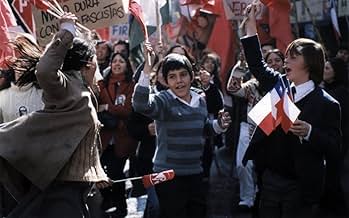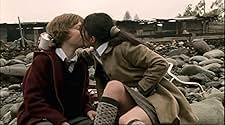IMDb रेटिंग
7.7/10
13 हज़ार
आपकी रेटिंग
चिली के विभिन्न सामाजिक वर्गों के दो 12 वर्षीय बच्चे 1973 में दोस्त बन जाते हैं. जैसे-जैसे उनके देश में राजनीतिक तनाव बढ़ता जाता है, उन दोनों को एक दूसरे की दुनिया का पता चलता है.चिली के विभिन्न सामाजिक वर्गों के दो 12 वर्षीय बच्चे 1973 में दोस्त बन जाते हैं. जैसे-जैसे उनके देश में राजनीतिक तनाव बढ़ता जाता है, उन दोनों को एक दूसरे की दुनिया का पता चलता है.चिली के विभिन्न सामाजिक वर्गों के दो 12 वर्षीय बच्चे 1973 में दोस्त बन जाते हैं. जैसे-जैसे उनके देश में राजनीतिक तनाव बढ़ता जाता है, उन दोनों को एक दूसरे की दुनिया का पता चलता है.
- पुरस्कार
- 13 जीत और कुल 8 नामांकन
Aline Küppenheim
- María Luisa Infante
- (as Aline Kuppenheim)
Daniel Alcaíno
- Sargento Ejército
- (as Daniel Alcaino)
फ़ीचर्ड समीक्षाएं
I live in Chile, where the movie happens. I have also followed Andres Wood in his career as a Director and I must say that this is his most mature, rounded and strong piece of work.
The Movie is centered in the social phenomena that happened in the last days before the Coup in 1973. Now the movie is incredibly accurate from the Costume Design, the Cars's License Plates, the expressions, the product brands and graffitis, to the social polarization, violence and killings. As remarkable as the Production is the honesty of the director, who could have easily fall into contaminating his movie with political propaganda, instead he kept delightfully accurate.
Even though for those who knows the history, the devastating feeling is all around, the movie centers in the social experiment led by a priest who was the principal of a high class school, who takes into the school some poor mestizo children.
Machuca is one of this children's who begins a friendship with a white rich children.
The story itself works as a metaphor for the innocence of the people in that time. innocence that was lost over and over.
The Movie is centered in the social phenomena that happened in the last days before the Coup in 1973. Now the movie is incredibly accurate from the Costume Design, the Cars's License Plates, the expressions, the product brands and graffitis, to the social polarization, violence and killings. As remarkable as the Production is the honesty of the director, who could have easily fall into contaminating his movie with political propaganda, instead he kept delightfully accurate.
Even though for those who knows the history, the devastating feeling is all around, the movie centers in the social experiment led by a priest who was the principal of a high class school, who takes into the school some poor mestizo children.
Machuca is one of this children's who begins a friendship with a white rich children.
The story itself works as a metaphor for the innocence of the people in that time. innocence that was lost over and over.
10aharmas
This film reaches back and looks at history in a very intimate and personal way. Its young protagonist is shown, growing up, not quite understanding what is happening around him. His own life is the middle of a crisis, and suddenly he is in the middle of his own country's political storm. Gonzalo is one of the lucky ones, a young man who escaped the horrors while he learned how to become a better human being.
Andres Wood's direction is assured and gentle. He shows his love of his country, its main characters, his own history (there are strong hints at this being at least auto-biographical). His film is beautifully scored and photographed; in addition to having one of the best performances ever by a group of children. The movie moves along quietly, touching us, teaching us, and taking us along in an unforgettable study of humanity at its worst and its best.
Andres Wood's direction is assured and gentle. He shows his love of his country, its main characters, his own history (there are strong hints at this being at least auto-biographical). His film is beautifully scored and photographed; in addition to having one of the best performances ever by a group of children. The movie moves along quietly, touching us, teaching us, and taking us along in an unforgettable study of humanity at its worst and its best.
In 1973, the Chilean military, under the direction of General Augusto Pinochet and backed by the CIA, overthrew the shaky socialist government of democratically elected President Salvador Allende. The coup led to the murder of 3,000 leftist Allende supporters and the detention of an estimated 250,000 political prisoners. Set against the background of the political instability that led to the crisis, Andrés Woods' Machuca is the moving story of the friendship between two boys from different sides of the social spectrum. Voted the most popular film at the 2004 Vancouver Film Festival and a major box-office hit in Chile, the semi-autobiographical film succeeds on both a human and a political level, the different elements coming together in a final conflagration.
Gonzalo Infante (Matias Quer) is a chubby, red-faced 11-year old who attends St. Patrick's private school. He lives in a wealthy neighborhood where his security is unquestioned, even though he knows that his mother Maria (Aline Kuppenheim) is having a long-standing affair with a well-to-do Argentine businessman. Gonzalo is shy and inexpressive and is often bullied at school. His life changes, however, when Father McEnroe (Ernesto Malbran), the priest who runs the school, opens St. Patrick's to those who are unable to pay, and Gonzalo develops a friendship with Pedro Machuca (Ariel Mataluna), a youngster who lives in a nearby shantytown. The inclusion of the marginal students causes unrest at the school. Fights break out between the two economic classes and parents hastily call meetings to voice their opposition to the "communist" priest. Gonzalo protects Pedro from the bullies and later visits Pedro in his home.
Aware of how much he has, Gonzalo accepts his status without feeling superior, though Pedro's family refers to him as "the snob". In a subplot, Pedro's seductive young cousin Silvana (Manuela Martelli) gives both boys an introduction to sexual pleasure. Though the relationship between the two boys develops naturally and their innocence allows them to see past the developing turmoil, the disturbing layers of adult events slowly begin to threaten their friendship. To pick up some extra money, the boys attend political rallies and sell Chilean flags to both the Nationalists and the Communists, but soon emotions escalate and street fights break out between far-left and far-right militants. The onset of revolt is signaled by the arrival of two jets flying towards the Presidential Palace, a seminal event in Chile's history that marked the end of their democracy.
One of Chile's most successful young filmmakers, Woods lets the facts speak for themselves, and Machuca makes its points with an emotional power unencumbered by bias or simplistic messages. While the upper middle class is shown as elitist and disdainful of the working class, Pedro's family is also not portrayed in glowing terms. In a drunken rage of victimization, the father tells his son that in a few years, "He (Gonzalo) will be working for Daddy....You'll be cleaning toilets." The children are portrayed as simply children without the false glow of larger-than-life heroism. Although Machuca may ultimately have more of an impact for Chileans who experienced the coup directly, its theme of young people caught in the swirl of events beyond their understanding resonates far beyond the details of this single tragic moment in history.
Gonzalo Infante (Matias Quer) is a chubby, red-faced 11-year old who attends St. Patrick's private school. He lives in a wealthy neighborhood where his security is unquestioned, even though he knows that his mother Maria (Aline Kuppenheim) is having a long-standing affair with a well-to-do Argentine businessman. Gonzalo is shy and inexpressive and is often bullied at school. His life changes, however, when Father McEnroe (Ernesto Malbran), the priest who runs the school, opens St. Patrick's to those who are unable to pay, and Gonzalo develops a friendship with Pedro Machuca (Ariel Mataluna), a youngster who lives in a nearby shantytown. The inclusion of the marginal students causes unrest at the school. Fights break out between the two economic classes and parents hastily call meetings to voice their opposition to the "communist" priest. Gonzalo protects Pedro from the bullies and later visits Pedro in his home.
Aware of how much he has, Gonzalo accepts his status without feeling superior, though Pedro's family refers to him as "the snob". In a subplot, Pedro's seductive young cousin Silvana (Manuela Martelli) gives both boys an introduction to sexual pleasure. Though the relationship between the two boys develops naturally and their innocence allows them to see past the developing turmoil, the disturbing layers of adult events slowly begin to threaten their friendship. To pick up some extra money, the boys attend political rallies and sell Chilean flags to both the Nationalists and the Communists, but soon emotions escalate and street fights break out between far-left and far-right militants. The onset of revolt is signaled by the arrival of two jets flying towards the Presidential Palace, a seminal event in Chile's history that marked the end of their democracy.
One of Chile's most successful young filmmakers, Woods lets the facts speak for themselves, and Machuca makes its points with an emotional power unencumbered by bias or simplistic messages. While the upper middle class is shown as elitist and disdainful of the working class, Pedro's family is also not portrayed in glowing terms. In a drunken rage of victimization, the father tells his son that in a few years, "He (Gonzalo) will be working for Daddy....You'll be cleaning toilets." The children are portrayed as simply children without the false glow of larger-than-life heroism. Although Machuca may ultimately have more of an impact for Chileans who experienced the coup directly, its theme of young people caught in the swirl of events beyond their understanding resonates far beyond the details of this single tragic moment in history.
Although i was not old enough to live through these events, its repercussions are still felt today. Its interesting to see this movie in the theater and hear older people in the audience booing and cheering at the different scenes and historical characters in the movie, meaning that it accurately depicts the events. The movie is excellent in the way it portrays the everyday life experienced back in those days. The movie is apolitical in the way the main characters are children, so the focus is everyday life more than taking an actual view. The great special effects used, increase the realism and makes the movie so much better, and you don't even notice they are being used.
I recommend this movie 100% both to Chileans, and foreigners that want a glimpse on the life of the upper/middle classes in Chile back in 1973.
I recommend this movie 100% both to Chileans, and foreigners that want a glimpse on the life of the upper/middle classes in Chile back in 1973.
10dsalvat1
This movie tells a tale on the eve of the darkest hour in Chileann history, where two boys of different social background become friends.
This is a very powerful film, especially for Chileanns and many Latin Americans that suffer the prejudice of classicism (the racism of Latin America) and their ideals being beaten away from them.
You will notice many resentments and insults on this message board as the film gets more exposure due to the fact that some people still live in the past.
I hope this film brings everybody together and shows that no matter what race, religion, sexual orientation or social class, children do not discriminate, everybody feels the same emotions.
Hate is learned by the actions of role models.
This is a very powerful film, especially for Chileanns and many Latin Americans that suffer the prejudice of classicism (the racism of Latin America) and their ideals being beaten away from them.
You will notice many resentments and insults on this message board as the film gets more exposure due to the fact that some people still live in the past.
I hope this film brings everybody together and shows that no matter what race, religion, sexual orientation or social class, children do not discriminate, everybody feels the same emotions.
Hate is learned by the actions of role models.
क्या आपको पता है
- ट्रिवियाAs stated by the director in several interviews, the movie was shot only on Sundays, due to its small budget.
- गूफ़Silvana is standing by the outhouse, then moments later, after camera pans, appears on the other side of Gonzalo.
- भाव
Patricio Infante: Socialism might be better for Chile but not for us.
- क्रेज़ी क्रेडिटIn the credits at the beginning of the film, the last letter of each word drifts slowly to the right separating from the names
- कनेक्शनFeatured in Sin maquillaje: Tamara Acosta (2013)
- साउंडट्रैकAi Amor
Written and performed by Buddy Richard
टॉप पसंद
रेटिंग देने के लिए साइन-इन करें और वैयक्तिकृत सुझावों के लिए वॉचलिस्ट करें
- How long is Machuca?Alexa द्वारा संचालित
विवरण
बॉक्स ऑफ़िस
- बजट
- $15,00,000(अनुमानित)
- US और कनाडा में सकल
- $26,676
- US और कनाडा में पहले सप्ताह में कुल कमाई
- $4,635
- 23 जन॰ 2005
- दुनिया भर में सकल
- $31,87,700
- चलने की अवधि1 घंटा 56 मिनट
- रंग
- ध्वनि मिश्रण
- पक्ष अनुपात
- 1.85 : 1
इस पेज में योगदान दें
किसी बदलाव का सुझाव दें या अनुपलब्ध कॉन्टेंट जोड़ें



